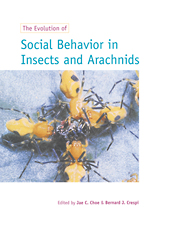Book contents
- Frontmatter
- Contents
- Contributors
- Acknowledgements
- Introduction
- 1 Are behavioral classifications blinders to studying natural variation?
- 2 Life beneath silk walls: a review of the primitively social Embiidina
- 3 Postovulation parental investment and parental care in cockroaches
- 4 The spectrum of eusociality in termites
- 5 Maternal care in the Hemiptera: ancestry, alternatives, and current adaptive value
- 6 Evolution of paternal care in the giant water bugs (Heteroptera: Belostomatidae)
- 7 The evolution of sociality in aphids: a clone's-eye view
- 8 Ecology and evolution of social behavior among Australian gall thrips and their allies
- 9 Interactions among males, females and offspring in bark and ambrosia beetles: the significance of living in tunnels for the evolution of social behavior
- 10 Biparental care and social evolution in burying beetles: lessons from the larder
- 11 Subsocial behavior in Scarabaeinae beetles
- 12 The evolution of social behavior in Passalidae (Coleoptera)
- 13 The evolution of social behavior in the augochlorine sweat bees (Hymenoptera: Halictidae) based on a phylogenetic analysis of the genera
- 14 Demography and sociality in halictine bees (Hymenoptera: Halictidae)
- 15 Behavioral environments of sweat bees (Halictinae) in relation to variability in social organization
- 16 Intrinsic and extrinsic factors associated with social evolution in allodapine bees
- 17 Cooperative breeding in wasps and vertebrates: the role of ecological constraints
- 18 Morphologically ‘primitive’ ants: comparative review of social characters, and the importance of queen–worker dimorphism
- 19 Social conflict and cooperation among founding queens in ants (Hymenoptera: Formicidae)
- 20 Social evolution in the Lepidoptera: ecological context and communication in larval societies
- 21 Sociality and kin selection in Acari
- 22 Colonial web-building spiders: balancing the costs and benefits of group-living
- 23 Causes and consequences of cooperation and permanent-sociality in spiders
- 24 Explanation and evolution of social systems
- Organism index
- Subject index
1 - Are behavioral classifications blinders to studying natural variation?
Published online by Cambridge University Press: 06 July 2010
- Frontmatter
- Contents
- Contributors
- Acknowledgements
- Introduction
- 1 Are behavioral classifications blinders to studying natural variation?
- 2 Life beneath silk walls: a review of the primitively social Embiidina
- 3 Postovulation parental investment and parental care in cockroaches
- 4 The spectrum of eusociality in termites
- 5 Maternal care in the Hemiptera: ancestry, alternatives, and current adaptive value
- 6 Evolution of paternal care in the giant water bugs (Heteroptera: Belostomatidae)
- 7 The evolution of sociality in aphids: a clone's-eye view
- 8 Ecology and evolution of social behavior among Australian gall thrips and their allies
- 9 Interactions among males, females and offspring in bark and ambrosia beetles: the significance of living in tunnels for the evolution of social behavior
- 10 Biparental care and social evolution in burying beetles: lessons from the larder
- 11 Subsocial behavior in Scarabaeinae beetles
- 12 The evolution of social behavior in Passalidae (Coleoptera)
- 13 The evolution of social behavior in the augochlorine sweat bees (Hymenoptera: Halictidae) based on a phylogenetic analysis of the genera
- 14 Demography and sociality in halictine bees (Hymenoptera: Halictidae)
- 15 Behavioral environments of sweat bees (Halictinae) in relation to variability in social organization
- 16 Intrinsic and extrinsic factors associated with social evolution in allodapine bees
- 17 Cooperative breeding in wasps and vertebrates: the role of ecological constraints
- 18 Morphologically ‘primitive’ ants: comparative review of social characters, and the importance of queen–worker dimorphism
- 19 Social conflict and cooperation among founding queens in ants (Hymenoptera: Formicidae)
- 20 Social evolution in the Lepidoptera: ecological context and communication in larval societies
- 21 Sociality and kin selection in Acari
- 22 Colonial web-building spiders: balancing the costs and benefits of group-living
- 23 Causes and consequences of cooperation and permanent-sociality in spiders
- 24 Explanation and evolution of social systems
- Organism index
- Subject index
Summary
ABSTRACT
Biologists frequently discuss behavioral attributes of species or more inclusive taxa, and organize these attributes into classifications for comparative studies. Such behavioral classifications may influence the kinds of questions biologists ask. Recently proposed revisions to a well–established definition of ‘eusocial’ behavior are intended to improve classifications of animal societies, and hence facilitate comparative studies. Crespi and Yanega (1995) propose to narrow the scope of eusociality, whereas Gadagkar (1994) and Sherman et al. (1995) aim to widen its scope. These new proposals, along with the traditional definition, are used here to discuss the important point that behavioral classifications are operational, and therefore different questions require different classifications. The revisions and the existing definition use arbitrary criteria, in the sense that a priori they do not specify ‘meaningful’ parameters. Moreover, social behavior can vary within taxa, so taxon–specific descriptions of social behavior may force a typological characterization that potentially masks interesting variability, especially for taxa that are not thoroughly studied. A natural classification would be advantageous in that it would take into account actual patterns of evolutionary history (phylogeny), and thus ensure the accurate assessment of convergent behavioral patterns. Without a natural classification, authors should precisely define terms in ways suited to their particular needs in a given study.
Information
- Type
- Chapter
- Information
- Publisher: Cambridge University PressPrint publication year: 1997
Accessibility standard: Unknown
Why this information is here
This section outlines the accessibility features of this content - including support for screen readers, full keyboard navigation and high-contrast display options. This may not be relevant for you.Accessibility Information
- 24
- Cited by
